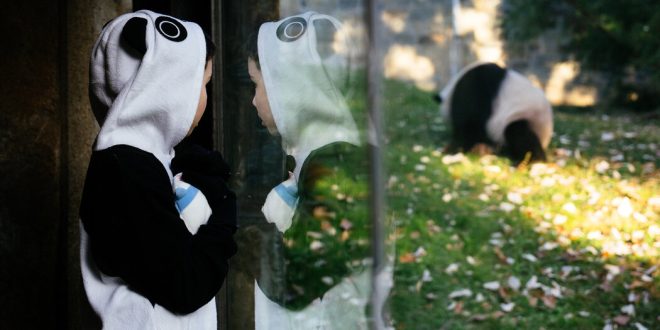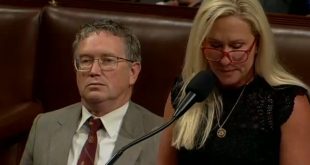The two adult pandas, Mei Xiang and Tian Tian, and their 3-year-old cub, Xiao Qi Ji, are scheduled to be loaded into crates that day and driven in trucks to a FedEx Boeing 777 called the Panda Express.
They will then be flown 19 hours from Dulles International Airport to China, where they will join about 150 other pandas in a lush nature preserve in the misty mountains of Sichuan Province.
And with that, an era of panda diplomacy will end, at least for now.
It began when Patricia Nixon, the first lady, mentioned her fondness for pandas — “I love them” — to China’s premier, Zhou Enlai, during the landmark visit she and President Richard Nixon made to Beijing in 1972. Within two months, China had sent a female and a male panda, Ling-Ling and Hsing-Hsing, to the National Zoo.
The panda presence in Washington has persisted ever since as a symbol of the ties between the United States and China.
The black-and-white fur balls that might as well be waddling stuffies had always struck me as natural diplomats: When I was living and working in Beijing, I took my family to the panda research center in the city of Chengdu, and my 3½-year-old daughter developed an enduring obsession with them.
But U.S.-China tensions have been rising for years, and now there is speculation that China is asking for the return of the pandas because of the diplomatic deep freeze.
Zoo officials and scientists say the actual reason comes down to biology, or “panda time.” The three pandas, they say, are each at an age when they should be going back to China.
Mei Xiang and Tian Tian arrived in 2000, about one year after Hsing-Hsing was euthanized due to kidney disease and eight years after Ling Ling’s passing from heart failure. The two new pandas stayed for a decade under the first formal pact, then remained under two consecutive five-year agreements. That last one ended early in the pandemic, and the partner association in China agreed to a three-year extension, which is about to expire.
Mei Xiang gave birth in August 2020, at an age when scientists had thought she would no longer be able to have a baby. And so the cub was named Xiao Qi Ji, or Little Miracle. He was her fourth surviving cub born in Washington.
Zoos that host pandas outside of China usually agree to send cubs back before they turn 4, and to send adults back when they are elderly — Mei Xiang is 25 and Tian Tian 26.
“They are at the age when they should be in China,” said Melissa Songer, a conservation biologist at the zoo who has worked with the pandas for 23 years. “I don’t want to have a panda pass away outside of China.”
Zoo Atlanta now has the only giant pandas in the United States — parents and twin cubs — but they are expected to return to China next year. An aging mother and her son in San Diego Zoo returned in 2019, and Ya Ya, a female panda in Memphis Zoo, flew back this April. Her companion, Le Le, was due to return with her but died in February from heart disease at age 25, an event that infuriated some Chinese citizens.
It takes more than bamboo groves to host a panda. For starters, the National Zoo paid a fee to a Chinese conservation partner of $500,000 per year for a pair (down from $1 million during Mei Xiang and Tian Tian’s first decade here).
Despite the costs, the four American zoos that have consistently hosted pandas have worked with two separate conservation groups in China to secure the agreements. Ms. Songer said the National Zoo intends to ask its partner, the China Wildlife Conservation Association, for a new pair.
When asked about that prospect, Liu Pengyu, the Chinese Embassy spokesman, did not answer. But he did say that giant pandas are “friendship ambassadors of the Chinese people” and that the collaboration between China and the National Zoo “has played an important role in enhancing the mutual understanding and friendship between the Chinese and American peoples.”
Zoo officials said they had not asked the State Department to get involved, nor did they intend to prod President Biden to put in a word with Xi Jinping, China’s leader, when the two meet in California next week.
Until recently, pandas were considered endangered, and so scientists at the National Zoo researched reproductive cycles to help with panda breeding. Ms. Songer said a female panda is fertile for only one or two days each year, and scientists monitor hormone levels using urine samples to determine when to do artificial insemination. That is how Little Miracle was born.
“We have it figured out, China has it figured out,” Ms. Songer said. “It’s been a huge success to reproduce them under human care.”
The panda population in China has grown, and now scientists are experimenting with reintroducing pandas into the wild.
Early Sunday morning, my daughter, Aria, now 11, and I watched as mother, father and son lumbered around their separate indoor and outdoor enclosures, chewing on bamboo, tumbling with plastic balls and clambering over boulders.
They looked about as cuddly as the stuffed pandas that Aria slept with every night. Aria regaled me with endless panda trivia: “Did you know that they eat 14 hours a day?”
The crowds ballooned, creating a sense of panda-monium.
Some had been coming daily, and some were making a repeat visit after popping in during the nine-day Panda Palooza festival earlier this fall. Others had heard the pandas were leaving and had traveled hundreds or thousands of miles to catch a glimpse.
“This will be the only animal I check out all day,” said Denise Fesser, 47, who had driven nearly three hours that morning from New Jersey. She had a zoo membership because of the pandas and visited several times a year. When she travels abroad, she flies in and out of Washington so she can see them.
“Xiao Qi Ji is the most fun to watch,” she said as she shot a few photos of him using a zoom lens. “It was one of those moments of pure joy when he was born during the pandemic.”
The Allen family drove eight hours from Charlotte, N.C., to see the pandas for the first time.
“I watched the panda cam every day during the pandemic,” said one of the children, Anna Kate, referring to cameras that the zoo had set up years ago to broadcast a panda reality show online.
“Maybe they’ll figure out how to make a pact for them to come back here to their home,” her mother, Gillian Allen, said. She paused. “But China is really their home.”
 Top Naija News: Nigerian News, Breaking News Nigeria and World News Top Naija News is a daily news publication in Nigeria, delivering the latest breaking news in Nigeria and around the world.
Top Naija News: Nigerian News, Breaking News Nigeria and World News Top Naija News is a daily news publication in Nigeria, delivering the latest breaking news in Nigeria and around the world.




